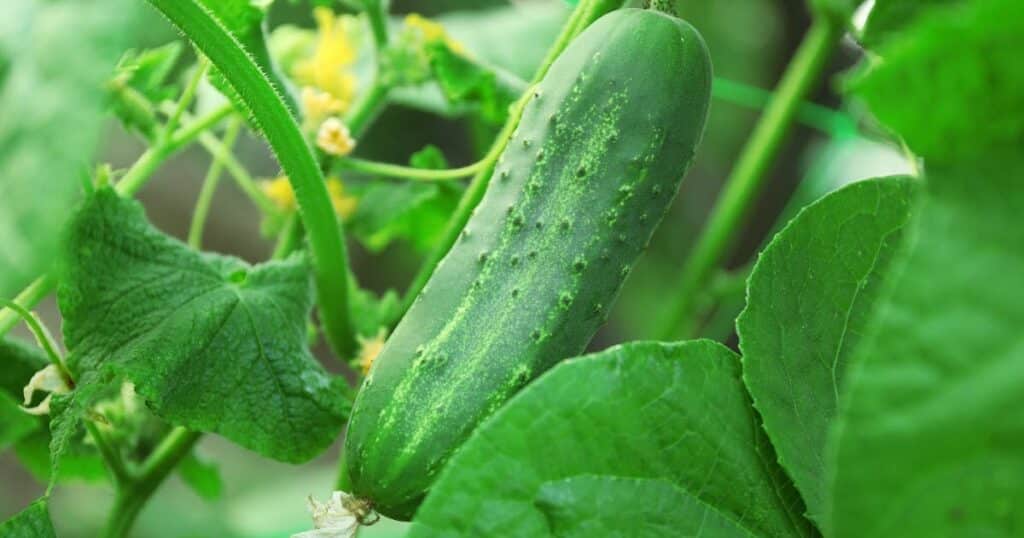Most of us love cucumbers because of their delicious taste and nutritional benefits. Maybe you even grow cucumbers in your vegetable garden. If there are deer populations in your area, you may wonder whether they eat cucumbers and will raid your patch. So, let’s find out: do deer eat cucumbers?
In short, the answer is yes – deer eat cucumbers. Deer have been known to eat cucumbers in the wild, particularly when food sources are limited. This isn’t surprising, considering that cucumbers are an excellent source of water and nutrition for wildlife.
Deer can eat a wide variety of vegetation, and what they eat at a specific time will depend on food availability.
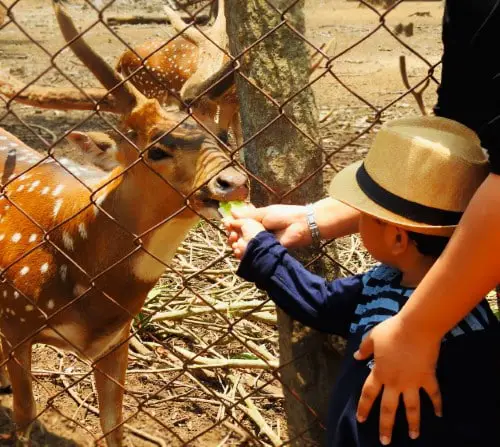
Deer diets involve a great deal of foraging and include a wide variety of plants, fruits, nuts, and vegetables.
Cucumbers are an excellent source of vitamins, minerals, electrolytes, and water which make them a desirable food for deer.
The coarse and hairy texture of the leaves and stems of these vines, however, are not desirable, and a dense canopy over the cucumbers themselves may offer your garden some protection.
Can You Feed Deer Cucumber?
Feeding deer cucumbers can be relatively harmless in small amounts as an occasional treat, but it is important to be aware of the potentially harmful side effects.
If you give deer large amounts of cucumber, it could lead to a nutritional imbalance.
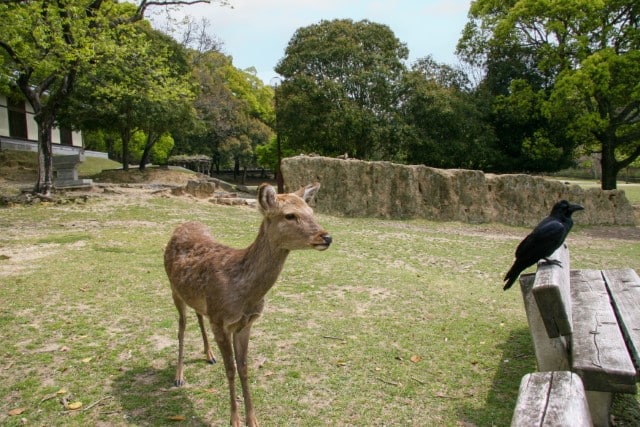
You should also be aware that deer can be negatively affected by being fed any kind of food by humans. Overfeeding can lead to health issues such as obesity, malnutrition, or even dependence on humans for food.
Yes, deer seem cute and you probably like to watch them. However, you won’t want to have them constantly hanging around your property.
You should also be aware that male deer can be aggressive, especially during their annual mating season.
If you are considering feeding deer cucumbers, make sure to monitor the amount and frequency of your feedings.
Cucumbers are native to India and have moved through Eastern culture throughout history, eventually landing in Western culture.
While some wild cucumbers are present in the US, there isn’t enough of a population for them to become a big part of the diet of wild deer.
Although they aren’t particularly harmful to deer, cucumbers should only be given as a treat in moderation just to be on the safe side. Wild animals aren’t under constant monitoring for issues in the same way pets are, so if something goes wrong, it’s much harder to observe.
Should You Feed Cucumber To Wild Deer?
It is not recommended to feed wild deer human food because it can lead to nutritional imbalances.
Wild deer have adapted to find and eat food that is available in their environment, so giving them other kinds of food can cause them harm.
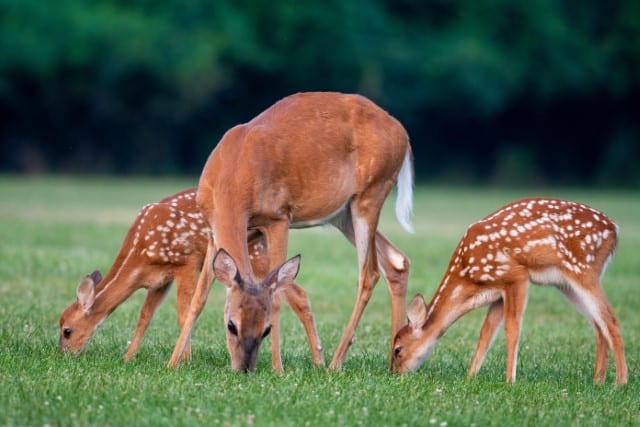
One of the most important reasons not to feed wild deer is that it can cause a dependency on humans. This can be dangerous for both deer and humans.
When wild deer find out they can get food from humans, it could even lead to aggressive behavior if they’re suddenly not fed or their food source is taken away.
In some cases, deer will lose their natural sense of caution around humans, which could eventually cause them to be a hazard.
Deer that aren’t wary enough of humans can end up in places where they can cause damage to property or even injure people. Feeding wild deer encourages them to stay close to humans, which can only end badly for the deer.
You don’t need to feed wildlife in order to enjoy seeing and spending time around it.
Explore natural parks where you can view cervids at a distance. It’s one of the best options, as it causes minimal interference and doesn’t result in the deer expecting food.
Like most wild animals, deer can be dangerous if they aren’t offered the space to do their own thing. This is especially true of bucks which grow antlers that they use to defend themselves.
Having wild deer sleeping in your backyard may seem fun, but it is important to remember that they are still wild animals and should be respected as such.
Will Deer Eat Cucumbers From Your Garden?
Deer have been known to take an interest in gardens and can cause a lot of destruction in a short amount of time. So, it’s not uncommon to wonder if they will eat cucumbers in your vegetable patch if they have the opportunity.
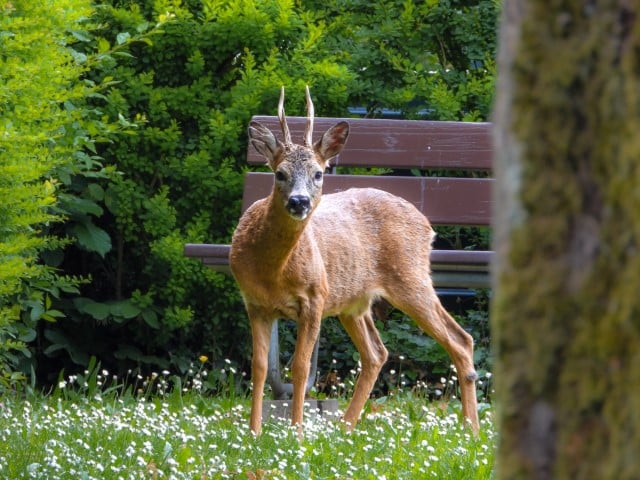
Here’s the good news: deer are much more likely to eat many other common garden vegetables and plants before they go for the cucumbers.
They are drawn to brightly colored fruits. Remember, they often eat berries in the wild.
However, a hungry deer will certainly greedily devour your cucumbers. They’re especially likely to be attracted to this vegetable if they’re thirsty and desperate for water, as cucumbers have excellent water content.
If you grow cucumbers and deer tend to come to your property, they will probably eat them.
The best option is to deter the deer, so they’re less likely to come into your gardens. You can do this with special sprays, fencing, and other methods.
If you go with fencing, it will have to be tall. Deer can jump high, so for the fencing to keep them out, it will have to be 7 feet tall minimum.
How To Prevent Deer From Eating What You Are Growing?
Deer are opportunistic eaters, and they can cause significant damage to your vegetable garden if they’re not deterred.
If you’re growing cucumbers and worried about deer eating your harvest, you need to be prepared.
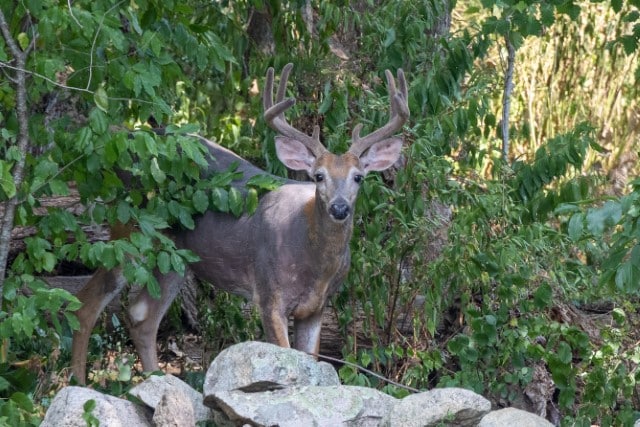
Yes, it can be fascinating to see deer around your property, and maybe you enjoy watching them explore.
But remember that your vegetable patch will pay the price if it is not protected.
The right kinds of deterrence measures to keep deer out of your garden may depend on the type and size of garden you have.
You may want to set up fencing around an entire section of your property, or you may prefer to take smaller measures that focus on the plants themselves.
Fencing
Fencing can be quite expensive and takes a lot of work to install. This is especially true if you’re trying to fence in your entire property.
Most deer can jump up to 7 feet with little effort, so any fencing will have to be at least that tall.
That is why it’s more practical to plant deer repelling plants around your cucumber. The smell of these plants will make deer not want to come near.
Deer Repellent Plants
For example, you can plant herbs such as rosemary, sage, and basil. Deer dislike the strong scents of these plants.
If you surround your vegetable garden with them, it will go a long way in keeping cervids at bay.
Deer also dislike thorny bushes and foliage, so you could also surround your vegetable patch with those kinds of plants.
Be aware that growing vegetables near plants deer like to eat will put your cucumbers at risk. And as they’re opportunistic eaters, the cucumbers are likely to end up on the menu, too.
Deer Repellent Spray
You can also try using deer repellent spray to keep cervids away. You will need to re-apply this kind of spray on a regular basis – especially after heavy rains.
Do Deer Eat Cucumbers? (yes)
Cucumbers can be a tasty and refreshing snack for deer. So, they’re likely to eat them if the opportunity presents itself.
However, you should avoid offering food to deer, as doing so can negatively affect these wild animals.
Most of us enjoy deer, but prefer not to find vegetable gardens (including and especially cucumbers) demolished because one or more members of the local herd decided to be a pest.
The tips included in this article can help you keep your cucumbers intact until you’re ready to harvest them.
And if you’d like to learn more about gardening with a hungry deer population, we invite you to read more while you’re here. Try our articles on deer resistant perennials and annuals deer dislike.

